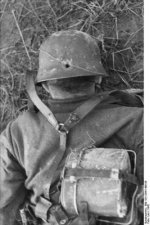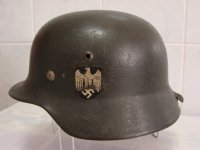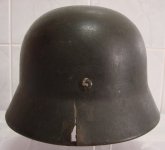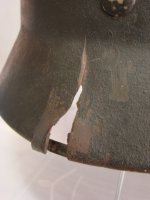
You are using an out of date browser. It may not display this or other websites correctly.
You should upgrade or use an alternative browser.
You should upgrade or use an alternative browser.
Sniper KIA
- Thread starter Hambone
- Start date
If my memory serves me correct I bleieve it was general Omar Bradley who made the remark that he did not want any german snipers taken alive...Looks more like an "execution"??
Bob
There is something inherently problematic (to me) with an MG nest blazing away at your friends, killing them in droves, or a sniper holding up a unit, killing your friends, then when these folks run out of ammo, they want to surrender.
There is a well documented episode where an SS sniper of the HJ div. (I think) held up alot of Brits in France, killing many. He ran out of ammunition, came out of his hide and said "OK fellows, I am out of ammunition now, you may shoot me". A red haired Brit NCO stepped up, pulled his revolver, and obliged him.
There is a well documented episode where an SS sniper of the HJ div. (I think) held up alot of Brits in France, killing many. He ran out of ammunition, came out of his hide and said "OK fellows, I am out of ammunition now, you may shoot me". A red haired Brit NCO stepped up, pulled his revolver, and obliged him.
"OK fellows, I am out of ammunition now, you may shoot me". A red haired Brit NCO stepped up, pulled his revolver, and obliged him.
Now there is guy dedicated to his cause and has no illusions about the consquesnces of his actions..
You play, you pay..no if ,ands , or buts..
If in fact it was an HJ it could one of 2 scenarios ...
(1)Fanaticism...never give up/retreat per your oath..
Or
(2) Reargard action ..covering a retreat of his kammeraden..
War is most certainly a horrible thing and probably rehardwire's any sense of civility you may have once had after awhile.
Dont think I could stand up to it myself...but I guess one never knows until the time comes....hope I am never tested
Galland, When I was young I would have, now, probably not unless the reasons were pretty significant. That's why they don't want 40+ in the military 
With the way the 12th SS HJ conducted themselves in and around Normandy, it would have been ridiculous for that sniper to think he wasn't going to get executed, particularly under those circumstances. He knew, and so did this Brits, that the 12th SS would have executed the entire lot of that Brit's squaddies. That SS HJ was on a rearguard delaying mission and likely knew his chances were slim. He merely got what he bargained for and meted out. 12th SS HJ had a running "feud" with units of the Canadian 3rd Div. and both sides didn't take many prisoners.
With the way the 12th SS HJ conducted themselves in and around Normandy, it would have been ridiculous for that sniper to think he wasn't going to get executed, particularly under those circumstances. He knew, and so did this Brits, that the 12th SS would have executed the entire lot of that Brit's squaddies. That SS HJ was on a rearguard delaying mission and likely knew his chances were slim. He merely got what he bargained for and meted out. 12th SS HJ had a running "feud" with units of the Canadian 3rd Div. and both sides didn't take many prisoners.
The shooting of POW's can't be tolerated.
Most of the forummembers here are disgusted that members of the SS Totenkopf division executed British POW's in Le Paradis in May 1940 but on the other end the forummembers "understand" one of the US officers that executes a bunch of German POW's in the series BoB.
Another example: some allied airmen became victims of an angry mob, that lynched them: a warcrime.
The same happened to German aircrew in France, Belgium & Poland in May 1940 & September 1939.
Also that is a warcrime.
In both examples the actions are basicly the same, the disarmed enemy is simply murdered.
Warcrimes are warcrimes, it doesn't matter which side commits them.
The Geneva convention wasn't written without reason!
It perhaps sounds understandable that someone feels the need to shoot the hated enemy, but what if the shoe is on the other foot?
If I ever became a POW, I would like that my foe would live by the basic rules of the Geneva convention and not simply shoot me in a ditch.
P
Most of the forummembers here are disgusted that members of the SS Totenkopf division executed British POW's in Le Paradis in May 1940 but on the other end the forummembers "understand" one of the US officers that executes a bunch of German POW's in the series BoB.
Another example: some allied airmen became victims of an angry mob, that lynched them: a warcrime.
The same happened to German aircrew in France, Belgium & Poland in May 1940 & September 1939.
Also that is a warcrime.
In both examples the actions are basicly the same, the disarmed enemy is simply murdered.
Warcrimes are warcrimes, it doesn't matter which side commits them.
The Geneva convention wasn't written without reason!
It perhaps sounds understandable that someone feels the need to shoot the hated enemy, but what if the shoe is on the other foot?
If I ever became a POW, I would like that my foe would live by the basic rules of the Geneva convention and not simply shoot me in a ditch.
P
Last edited:
Galland, When I was young I would have, now, probably not unless the reasons were pretty significant. That's why they don't want 40+ in the military
With the way the 12th SS HJ conducted themselves in and around Normandy, it would have been ridiculous for that sniper to think he wasn't going to get executed, particularly under those circumstances.
I agree Ham.....I am sure everyone in the 12 ss expected no less.
And yes , their legendary /infamous exploits and running battles with the canadian are well documented on both sides....
5 years of bombing and and several years of indoctination can make for a very heartless foe...
I think the definition right of right and wrong, good and bad can disappear quite quickly when desperation sets in and your back is against the wall.
I am not saying that what the ss did in many cases can be condoned, but can be understood from the perspective of 65 years of study of the historical record.
There is No excuse for anything they did, but there are explantions, and some have merit and many do not
I read once that there is a school of thought that maintains that there is no right or wrong...just the consquences of your actions...and on a certain level I get it.
As peter U said...there was no shortage of atrocities on both sides....but the SS have a reputation they have earned.....(they were not pikers by any stretch of the imagination).and a lot of allied atrocities were most likely ignored or covered up..
All of that said I find that after a lot of study I have come to find a lot of truth in thhe quote by napolean"What is history but a fable agreed upon"...and yes history is written by the victors..
Good discussion...
The shooting of POW's can't be tolerated.
Another example: some allied airmen became victims of an angry mob, that lynched them: a warcrime.
The same happened to German aircrew in France, Belgium & Poland in May 1940 & September 1939.
Also that is a warcrime.
In both examples the actions are basicly the same, the disarmed enemy is simply murdered.
Warcrimes are warcrimes, it doesn't matter which side commits them.
Peter...I have always thought the bombing of civilian cities was an act worthy of war crime status.
Many say that the germans brought it on theirselves by bombing London but the historical record shows that on April 24th ,1940, 2 bombers got lost on their way to raid the airfields and accidently bombed the outskirts of London.
Britian responded by immediately bombing Berlin for the next 3 nites...after the 3rd raid germany started to retaliate and the rest is history.
I am still amazed to this day that there are attempts to condone ,and justify the Allies repeated bombing of civilian population centers.
Many a historian says it was necessary to help end the war...?
I respectfully disagree because the evidence does not bear that out
After 5 years of constant bombing the war didnt end until Hitler was dead and the Russians were putting a flag on top of the Reichstag...nobody cried Uncle because of being bombed.
One would think that the average military tactician would realize that you dont demoralize the enemy by destroying his home and killing his family....when you do that you harden ones resolve for revenge.
Many a shrink has made the observaton that humans are incredibly resilient and when you bomb someone constantly it becomes part of the daily events....like the weather..
They could have taken the example of the Londoners to draw conclusions.
No one in London wanted to surrender...they wanted to fight on...ergo the german morale to soldier on
Not to mention that killing civilians has no effect of empathy on dictaors...dictators care only about themselves...not their populace...thats why they are dictators.
And finally....in a postwar review of german industry it was found that they had an incredibly fragile electric grid and that if the bombing of civilain cities had been targeted @ the abilty to make electric , and fuel, they could have ended the war as much as 2 years earlier....supposition i know, but still a point worth noting.
Why endanger air crews killing civilians when you should be targeting the enmies ability to make war and defend itself....as an observer of human nature it seems like a no brainer to me...but then again...I dont have a phd behind my name so what the hell do I know...
Just my 2 cents...
Last edited:
Peter, that's a neat helmet, if one disregards what it represents. Looks like a round through the face and out the back. A high velocity rifle round encountering the thick frontal lobe of the scull would be slowed to do that I think. A low velocity pistol round would have the same effect not hitting skull.
reich1900
Senior Member
For any bombed cities it still doesn't end
World War II | 07.11.2010
German town lives with lethal legacy of World War II
Großansicht des Bildes mit der Bildunterschrift: Allies dropped 1.9 million tons of bombs on GermanyOranienburg has more unexploded bombs in its soil than any other German town or city. This week, another bomb was removed from its soil, a reminder to residents that they still live with lethal remnants from the war.
On a grey November morning, Manfred Gellert's red fire brigade car rolled along a cobblestone street in Oranienburg.
The streets were eerily empty, and there was no one to be seen in the well-kept gardens and houses in this eastern German town.
Bildunterschrift: Großansicht des Bildes mit der Bildunterschrift: Parts of Oranienburg became a no-go area for some 4,500 inhabitants
This was good news for the 57-year-old deputy head of Oranienburg's fire brigade, since it meant local residents had obeyed orders that required them to evacuate this part of town as of 8 o'clock that morning.
Residents were generally "calm and composed in view of the evacuations," he said.
After all, it was the 159th bomb that has had to be removed in 20 years, and since this time about 4,500 people had to leave their homes "the numbers were not unusually high."
Most went to work as usual, or went to stay with friends and family outside the no-go area. Temporary shelters were arranged for the people with no where else to go in a church and buildings owned by the municipality.
Lethal legacy
During World War II, Oranienburg was the target of massive bombing raids flown by the United States and Britain.
Bildunterschrift: Großansicht des Bildes mit der Bildunterschrift: German cities were subject to massive bombing during World War II
The Allies dropped more than 10,000 bombs, each weighing 500 lbs. or 1000 lbs. (250 or 500 kg), to destroy targets such as the Heinkel-Werke aircraft manufacture plant, a railway junction for trains to the eastern front and an arms depot belonging to Hitler's elite SS soldiers.
The Auer-Werke, a chemical company situated close to the town center, endured especially massive bombardment, since it was thought to produce chemicals used in Nazi atomic bomb research.
According to Wolfgang Spyra, a bomb researcher at the Technical University of Cottbus, the bombs had a dud rate of between 7 percent and 15 percent. Taking that information and deducting what has already been removed in Oranienburg, his team estimates that there are still at least 325 bombs underneath the town.
In early 2010, Spyra went public with a study into Oranienburg's unexploded bombs, which he based on original documents, including aerial photos and bombardment plans, and American and British war archives.
His study found that the bombs still underground remain extremely dangerous, largely because most of them have delay-action detonators which have become brittle after 65 years.
"They could cause the bomb to go off any day," he said.
There have been three spontaneous explosions in Oranienburg since 1991, resulting in several injuries.
Soil stopped explosions
When they were dropped 65 years ago, many bombs didn't explode due to Oranienburg's soft soil, which has a hard layer of gravel underneath. Bombs would often penetrate the earth, bounce off the gravel and come to rest underground with their tips pointing back upwards.
Positioned vertically, gravity stops the chemical detonators from working. The detonators contain a vial of acetone that bursts on impact and is meant to trickle down and dissolve a celluloid disk that restrains the cocked firing pin.
But when the bomb is pointed upwards, the acetone seeps away from the celluloid.
Bildunterschrift: Großansicht des Bildes mit der Bildunterschrift: Houses in Oranienburg were protected to prevent damage from the blast
Bomb No.159 had a chemical detonator "worn and twisted to an extent that makes any manual defusion impossible," said Horst Reinhardt, one of Germany's most experienced bomb disposal experts.
For the head of Brandenburg's state-run Explosive Ordnance Removal Service, the bomb is 150th he has removed and, at eight meters (26 feet) down, the deepest one he has ever found.
It lay in a small wooded area, surrounded by dozens of houses, with some of them roughly 50 meters away.
Disposal experts erected walls of wood to deflect the force of the blast. Engineers had put sheet piling around the bomb and filled the space in-between with water. Bales of straw were stacked on top of it.
Bildunterschrift: Großansicht des Bildes mit der Bildunterschrift: The explosion left a huge crater and torn metal pilings, but spared the houses
Around midday, the bomb was detonated, and from as far as a kilometer away a shower of earth, water and straw thrown up into the air was visible.
"When I heard the explosion, it was the first time I really felt scared," said Guenther Dregler, whose house was the one closest to the bomb site.
But he was able to breathe a sigh of relief after he returned. The only sign of distress to his property was a few books that had fallen off a shelf.
Continuing worries
But while Dregler's worries may be over for now, town authorities will be living with the headache of unexploded ordinance for a long time.
Bildunterschrift: Großansicht des Bildes mit der Bildunterschrift: Flowers for the heros of the bomb disposal crew
"Proactive bomb searching and removal in Oranienburg won't be a matter of months and years," said bomb researcher Spyra. "It will be a matter of decades."
It's also an expensive proposition, costing up to 420 million euros ($597 million) to remove all of the 325 bombs authorities expect to find.
In view of the danger for the people of Oranienburg, authorities this week barred all heavy traffic from some of the most contaminated streets in the town. This summer three bus routes were changed to minimize the risk to passengers.
Author: Uwe Hessler
Editor: Kyle James
World War II | 07.11.2010
German town lives with lethal legacy of World War II
Großansicht des Bildes mit der Bildunterschrift: Allies dropped 1.9 million tons of bombs on GermanyOranienburg has more unexploded bombs in its soil than any other German town or city. This week, another bomb was removed from its soil, a reminder to residents that they still live with lethal remnants from the war.
On a grey November morning, Manfred Gellert's red fire brigade car rolled along a cobblestone street in Oranienburg.
The streets were eerily empty, and there was no one to be seen in the well-kept gardens and houses in this eastern German town.
Bildunterschrift: Großansicht des Bildes mit der Bildunterschrift: Parts of Oranienburg became a no-go area for some 4,500 inhabitants
This was good news for the 57-year-old deputy head of Oranienburg's fire brigade, since it meant local residents had obeyed orders that required them to evacuate this part of town as of 8 o'clock that morning.
Residents were generally "calm and composed in view of the evacuations," he said.
After all, it was the 159th bomb that has had to be removed in 20 years, and since this time about 4,500 people had to leave their homes "the numbers were not unusually high."
Most went to work as usual, or went to stay with friends and family outside the no-go area. Temporary shelters were arranged for the people with no where else to go in a church and buildings owned by the municipality.
Lethal legacy
During World War II, Oranienburg was the target of massive bombing raids flown by the United States and Britain.
Bildunterschrift: Großansicht des Bildes mit der Bildunterschrift: German cities were subject to massive bombing during World War II
The Allies dropped more than 10,000 bombs, each weighing 500 lbs. or 1000 lbs. (250 or 500 kg), to destroy targets such as the Heinkel-Werke aircraft manufacture plant, a railway junction for trains to the eastern front and an arms depot belonging to Hitler's elite SS soldiers.
The Auer-Werke, a chemical company situated close to the town center, endured especially massive bombardment, since it was thought to produce chemicals used in Nazi atomic bomb research.
According to Wolfgang Spyra, a bomb researcher at the Technical University of Cottbus, the bombs had a dud rate of between 7 percent and 15 percent. Taking that information and deducting what has already been removed in Oranienburg, his team estimates that there are still at least 325 bombs underneath the town.
In early 2010, Spyra went public with a study into Oranienburg's unexploded bombs, which he based on original documents, including aerial photos and bombardment plans, and American and British war archives.
His study found that the bombs still underground remain extremely dangerous, largely because most of them have delay-action detonators which have become brittle after 65 years.
"They could cause the bomb to go off any day," he said.
There have been three spontaneous explosions in Oranienburg since 1991, resulting in several injuries.
Soil stopped explosions
When they were dropped 65 years ago, many bombs didn't explode due to Oranienburg's soft soil, which has a hard layer of gravel underneath. Bombs would often penetrate the earth, bounce off the gravel and come to rest underground with their tips pointing back upwards.
Positioned vertically, gravity stops the chemical detonators from working. The detonators contain a vial of acetone that bursts on impact and is meant to trickle down and dissolve a celluloid disk that restrains the cocked firing pin.
But when the bomb is pointed upwards, the acetone seeps away from the celluloid.
Bildunterschrift: Großansicht des Bildes mit der Bildunterschrift: Houses in Oranienburg were protected to prevent damage from the blast
Bomb No.159 had a chemical detonator "worn and twisted to an extent that makes any manual defusion impossible," said Horst Reinhardt, one of Germany's most experienced bomb disposal experts.
For the head of Brandenburg's state-run Explosive Ordnance Removal Service, the bomb is 150th he has removed and, at eight meters (26 feet) down, the deepest one he has ever found.
It lay in a small wooded area, surrounded by dozens of houses, with some of them roughly 50 meters away.
Disposal experts erected walls of wood to deflect the force of the blast. Engineers had put sheet piling around the bomb and filled the space in-between with water. Bales of straw were stacked on top of it.
Bildunterschrift: Großansicht des Bildes mit der Bildunterschrift: The explosion left a huge crater and torn metal pilings, but spared the houses
Around midday, the bomb was detonated, and from as far as a kilometer away a shower of earth, water and straw thrown up into the air was visible.
"When I heard the explosion, it was the first time I really felt scared," said Guenther Dregler, whose house was the one closest to the bomb site.
But he was able to breathe a sigh of relief after he returned. The only sign of distress to his property was a few books that had fallen off a shelf.
Continuing worries
But while Dregler's worries may be over for now, town authorities will be living with the headache of unexploded ordinance for a long time.
Bildunterschrift: Großansicht des Bildes mit der Bildunterschrift: Flowers for the heros of the bomb disposal crew
"Proactive bomb searching and removal in Oranienburg won't be a matter of months and years," said bomb researcher Spyra. "It will be a matter of decades."
It's also an expensive proposition, costing up to 420 million euros ($597 million) to remove all of the 325 bombs authorities expect to find.
In view of the danger for the people of Oranienburg, authorities this week barred all heavy traffic from some of the most contaminated streets in the town. This summer three bus routes were changed to minimize the risk to passengers.
Author: Uwe Hessler
Editor: Kyle James







